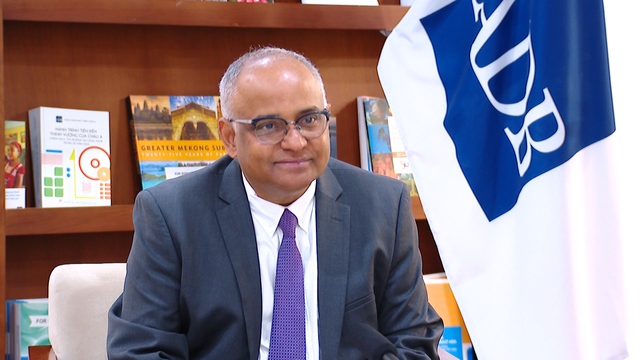Successful Year For Viet Nams Diplomacy
|
(31/12/2007) Deputy Prime Minister and Foreign Minister Pham Gia Khiem affirmed that the diplomatic service has made tremendous contributions to the country’s overall successes in 2007 during a recent interview with
Q: Could you talk about the outstanding achievements of the diplomatic service in 2007 and orientations for its operation in 2008? A: The year 2007 left each Vietnamese with the feelings of excitement and pride in the country’s important strides in the cause of socio-economic development and international integration. Under the correct and timely leadership and with direct involvement of the Party, State, Government and National Assembly leaders, building on the country’s new position and successes obtained in 2006, diplomatic tasks continued to be carried out in a comprehensive manner, thus harvesting tremendous important achievements and greatly contributing to the country’s common successes. What I want to mention, first of all, is that we have brought the friendship and cooperation framework with many countries, especially important partners, to new heights, and opened up new opportunities for cooperation with potential partners. The diplomatic service has helped firmly safeguard the nation’s sovereignty, security and territorial integrity and effectively counter intervention and sabotage schemes against the Socialist Republic of Viet Nam. Second, the diplomatic sector has worked hard to serve economic development as reflected in the attraction of a record amount of foreign direct investment (FDI) and official development assistance (ODA), the growth of trade, tourism, labour export, and foreign remittance, thus bringing in new opportunities for the country’s economy to grow further in the coming years. Third, multilateral foreign activities continued to be deployed actively, thus resulting in a prominent event in the year that was the country’s election to the United Nations Security Council as a non-permanent member for the 2008-09 term with the overwhelming vote. The fourth achievement is the important gains in the protection of Vietnamese citizens abroad and affairs relating to overseas Vietnamese. Those gains were the results of a series of policies and concrete measures adopted by the Government, including the Prime Minister’s decision to exempt visas for overseas Vietnamese; measures to protect legitimate interests of the Vietnamese community, including Vietnamese businesses, entrepreneurs, labourers and citizens abroad. And the last outstanding achievement is dedicated to the external information and cultural service which has made constant efforts to spread the image of a dynamic, renewal, friendly and loyal For the present and future requirements, the foreign affairs service should continue to renew its way of thinking while grasping thoroughly the directions and tasks outlined in the tenth Party congress’s policies and resolutions. The service is also required to be active, dynamic and efficient in its activities, coordinate closely with the political system, the economic sector, the cultural service, the defence, security forces and the people-to-people diplomacy service in order to create an aggregate strength to successfully implement the renewal process as well as national industrialisation and modernisation. Rested on those foundations, the foreign service in the coming time will focus on major orientations as follow: First, continuing to strengthen, complete and elevate the cooperative framework with other countries; bringing into full play the country’s role as the United Nations Security Council non-permanent member; taking a more active part in multilateral forums in the region and the world; and enthusiastically joining in settling global issues in order to heighten the country’s prestige and position. Second, beefing up external activities in service of economy; deploying the Government’s action plan to implement the tenth Party Central Committee’s resolution No. 4 on developing the national economy in a fast and sustainable manner; and accelerating multilateral cooperation in the fields of culture, education, science and technology. Third, striving to complete the demarcation and the planting of landmarks on the border the country shared with neighbouring countries within 2008; promptly addressing land and water border-related issues arising with other countries so as to create a favourable environment for development and the firm protection of the country’s sovereignty and territorial integrity. Fourth, continuing to speed up the implementation of the Political Bureau and the Government’s action plan on the affairs relating to overseas Vietnamese in the new situation; reinforcing the protection of citizens coupled with creating favourable conditions for overseas Vietnamese to integrate into their host countries successfully while making contributions to national construction and defence at their homeland. Fifth, reinforcing the efforts to renew and increase the efficiency of external information and cultural service in collaboration with external political and economic tasks. Q: One of the driving forces behind the country’s economic successes last year is attributed to external economic diplomatic activities. Could you introduce the notable outcomes of these activities last year? A: As new opportunities are opening up for the country, the diplomatic service chose the year 2007 as the year of economic diplomacy. Last year, Economic diplomacy has achieved the following successes: First, the linkage between external political affairs and external economic performance has grown to be more effective. A series of visits by Party, State and Government leaders to many countries succeeded politically and economically, lifting the country’s relationship with these countries to a new plane and bringing in economic deals worth tens of billions of US dollars. Second, the foreign service has done a good work as an advisor to the country’s leaders, particularly in expanding the country’s relationship with leading partner countries. The foreign ministry has made recommendations and organisational work for the Prime Minister’s participation in the World Economic Forum in Davos. The short trip was proven very effective as it opened a real chance for The foreign ministry has advised the Government on ways to draw in idle money from the Gulf region (the This resulted from the efforts made by the foreign ministry, the visit to the region by Permanent Deputy Foreign Minister Nguyen Sinh Hung, the Minister of Planning and Investment and the deputy foreign minister as a special envoy of the Vietnamese government. This was also owing to the national conference on cooperation with the Third, the foreign ministry has employed a package of diverse activities to support localities and businesses practically and effectively. The foreign ministry has, for the first time, organised an external economic promotion programme for seven poor The foreign ministry also took the lead in coordinating with the central city of The year 2007 was the first year that saw the foreign ministry hosting receptions for big foreign business delegations who came to seek business and investment opportunities in Prominent were the Chairman of the US’s GE group, the two Thai business delegations led by Amata and CP group leaders, the Sunwah group of Hong Kong and the Tata group of India. The foreign ministry has assisted the US-ASEAN Business Council in organising the tour of representatives from 18 The economic diplomacy work has received supports and active coordination of many ministries, sectors, localities, and businesses. As a result, the economic diplomacy year was a success, making practical contributions to national development. Q: A: Becoming a member of the UN Security Council is both an honour and a responsibility and a challenge to us. We were aware of this when deciding our candidacy in 1997 so in parallel with rallying the support from other countries for the bid, we had made meticulous preparations over the last decade in order to be able to perform well the role as an UN Security Council non-permanent member. So far, with the coordination of various ministries and sectors, we can say that preparations have fundamentally been completed. Regarding the decision making mechanism, we have studied, constantly updated with information and consulted other countries, especially the UN Security Council members, on the issues that the UN Security Council is considering. By doing so, we systematise our basic viewpoints and work out proper handling methods. In addition, we have decentralised the decision making process to ensure decisions are made quickly while still ensuring national interests and responsibility to the international community. On organisational work, we have developed synchronous and tight coordination mechanisms, including a mechanism for ministries, boards, branches and inter-department working groups in the foreign ministry, and another for the foreign ministry and the Vietnamese delegation to the UN. We have planned, and in fact, have pushed up consultancy and the sharing of information at the capital and representative mission levels with both members and non-members of the UN Security Council, especially with all the five UN Security Council permanent members. Many countries have said they hold high regard for On the personnel issue, this will be a long process. We had sent our staff to both domestic and foreign training courses to improve their skills related to multilateral diplomacy and understanding on the issues relating to the organisation and functions of the UN Security Council. In the past two years, the Vietnamese permanent representative delegation to the UN has been reinforced with many experienced and capable members. I am confident that with the country’s new position and role, accumulated experiences and careful preparations, especially the close instruction of the Party and State, the coordination and involvement of many sectors and the whole-hearted support by the entire people, we will surely fulfil our responsibility as the UN Security Council non-permanent member in the 2008-09 period, and actively contribute to peace, stability and development in the world. |
source: VNA
More Articles
- • Government sets high targets for steel industry
- • Investors, listed companies need to cooperate more closely
- • Japanese top legislators vow to deepen ties with Viet Nam
- • Agenda Toward a Strategic Partnership between Japan and Vietnam
- • Vietnamese President successfully concludes Japan visit
- • Vietnam attaches great importance to developing ties with Japan
- • Japan’s senior law maker vows to boost ties with Viet Nam
- • Vietnamese Foreign Minister meets with Japanese counterpart
- • State, Gov’t leaders assure Koizumi of stronger ties with Japan
- • State President welcomes Japanese, Malaysian CEOs



